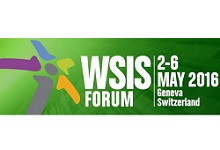From cybersecurity to cyber safety and security
5 May 2016 15:00h
Event report
[Read more session reports and live updates from the WSIS Forum 2016.]
The thematic workshop was organised by the EC Medici Framework Cooperation and moderated by Secretary General, Alfredo M. Ronchi.
Prof. Sarah Fox (Coventry University) presented the challenges faced by commercial aviation dealing with cyber terrorism. ‘Cyber is not the number one threat, but it will become so in the near future’, she said. From her point of view, we are moving to a new face of terrorism for which we are yet not ready. Fox outlined the necessity for coordination and cooperation between countries.
Mr Andrea Medico (Intellitronika) presented a device called ‘Virgo System’, an electronic wearable that tracks location and position of fire fighters and operators in high risk areas. It can be placed on different locations of the body (shoulder, chest, arms), and works in extreme weather conditions. According Medico, it uses standard IP67–ATEX. Virgo can be connected to a mobile device and through it to an emergency centre. The main values are autonomy, connection capability, the roughness, and its light weight.
Prof. Chiara Francalanci (Politecnico di Milano) spoke about linking social media and managing critical disasters. As a result of her investigation she observed how people use social media applications and not dedicated apps in the case of an emergency. Another project in which she took part was the analysis of news posted on websites by extracting information of critical events, the type of event, and dates. The research linked expressions on social networks about the disaster and generated profiles of how people tend to respond to crises.
Dr Matteo Basso (Observatory on Security and Defence CBRNe) pointed out the necessity of thinking not only in terms of information sharing and its quickness but also in terms of security and vulnerabilities. According to Basso, this could be done by providing good quality information (legal and technical) to decision-makers.
From Japan, Prof. Lynn Thiesmeyer (Keio University) presented her team’s research of localised data captured in slow-onset disaster-impacted communities in Laos, Thailand, and Myanmar.
Mr Pavan Duggal (Pavan Duggal Associates) differentiated between the concepts of cybersecurity, cybercrime and cyberwarfare. ‘Cybersecurity is an international paradigm that must be faced internationally’, he said, ‘We have the European Convention on Cybercrime, but cybersecurity is larger.’ Duggal called for an International Convention on Cyberlaw & Cybersecurity that would help to study the cyberlaw jurisprudence around the world.
Dr Samia Melhem (Transport & ICT, The Word Bank) was absent during the workshop.
by Matias Jackson
Related topics
Related event

